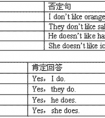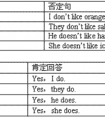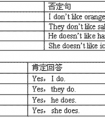下面的句子中含有一处错误,请选出来,并改在右边的横线上。( ) 1. I can't finds my pen.__________________ A B C D ( ) 2. What do his father do? _______________-六年级英语
21. by
(1)在------之前 We must be at home by 6 o’clock.
(2)乘------交通工具 People can go to the moon by spaceship.
I go to school by bus.
22.with
(1) 用 I write a letter with a pen.
(2) 和------一起 He went to Shenzhen with his parents.
23. between
在------与------之间 There is a football match between Class One and Class Three.
24. into
到------里 Sharks can dive into the deep cold water.
25. like
(1)象------ The twins are like their father.
(2)长相------怎样? What’s he like?
26. up
向上 Put up your hands if you have any questions.
27. down
向下 Put down all the books here.
28. about
(1) 大约;关于 It’s about 6:00 now.
(2) ------怎么样? What about---? How about---?
29. what for
为什么 But what for?
早、午、晚要用in,at黎明、午夜、点与分。
年、月、年月、季节、周,阳光、灯、影、衣、冒in。
将来时态in...以后,小处at大处in。
有形with无形by,语言、单位、材料in。
特征、方面与方式,心情成语惯用in。
介词at和to表方向,攻击、位置、恶、善分。
日子、日期、年月日,星期加上早、午、晚,
收音、农场、值日on,关于、基础、靠、著论。
着、罢、出售、偷、公、假,故意、支付、相反,准。
特定时日和"一……就",on后常接动名词。
年、月、日加早、午、晚,of之前on代in。
步行、驴、马、玩笑on,cab,carriage则用in。
at山脚、门口、在当前,速、温、日落、价、核心。
工具、和、同随with,具有、独立、就、原因。
就……来说宾译主,对、有、方状、表细分。
海、陆、空、车、偶、被by,单数、人类know to man。
this、that、tomorrow,yesterday,next、last、one。
接年、月、季、星期、周,介词省略已习惯。
over、under正上下,above、below则不然,
若与数量词连用,混合使用亦无关。
beyond超出、无、不能,against靠着,对与反。
besides,except分内外,among之内along沿。
同类比较except,加for异类记心间。
原状because of,、 owing to、 due to表语形容词
under后接修、建中,of、from物、化分。
before、after表一点, ago、later表一段。
before能接完成时,ago过去极有限。
since以来during间,since时态多变换。
与之相比beside,除了last but one。
复不定for、找、价、原,对、给、段、去、为、作、赞。
快到、对、向towards,工、学、军、城、北、上、南。
but for否定用虚拟,复合介词待后言。
ing型由于鉴,除了除外与包合。
之后、关于、在......方面,有关介词须记全。
in内to外表位置,山、水、国界to在前。
考点名称:助动词
助动词:
协助主要动词构成谓语动词词组的词叫助动词,被协助的动词称作主要动词。
构成时态和语态:助动词是语法功能词,自身没有词义,不可单独使用,它没有对应的汉译,
例如:Hedoesn'tlikeEnglish.他不喜欢英语。(doesn't是助动词,无词义;like是主要动词,有词义)- 小学涉及到的助动词主要是do,以及它的两种时态:does和did。
例:Does he work in the factory? 他是在这个工厂工作吗?
Do you have a pen? 你有一支钢笔吗?
He didn’t go to school yesterday. 他昨天没有去上学。
助动词do 的用法:
1)构成一般疑问句,例如:
Do you want to pass the CET? 你想通过大学英语测试吗?
Did you study German? 你们学过德语吗?
2) do + not 构成否定句,例如:
I do not want to be criticized. 我不想挨批评。
He doesn't like to study. 他不想学习。
In the past, many students did not know the importance of English. 过去,好多学生不知道英语的重要性。
3)构成否定祈使句,例如:
Don't go there. 不要去那里。
Don't be so absent-minded. 不要这么心不在焉。
说明: 构成否定祈使句只用do,不用did和does。
4)放在动词原形前,加强该动词的语气,例如:
Do come to my birthday party. 一定来参加我的生日宴会。
I did go there. 我确实去那儿了。
I do miss you. 我确实想你。
5) 用于倒装句,例如:
Never did I hear of such a thing. 我从未听说过这样的事情。
Only when we begin our college life do we realize the importance of English.
只有在开始大学生活时我们才认识到英语的重要性。
说明: 引导此类倒装句的副词有never, seldom, rarely, little, only, so, well等。
6)用作代动词,例如:
---- Do you like Beijing? --你喜欢北京吗?
---- Yes, I do. --是的,喜欢。(do用作代动词,代替like Beijing.)
He knows how to drive a car, doesn't he?
他知道如何开车,对吧? - 基本助动词:
be, do, have, 他们没有词汇意义,只有语法作用,如协助构成进行体,完成体,被动态,否定句,疑问句等。
例如 He is giving a lecture. 他在作报告
He has made a plan. 他已经订了计划
The small animals are kept in the cages. 小动物都关在笼子里。
助动词协助主要动词完成以下功用:
a. 表示时态,例如:
He is singing. 他在唱歌。
He has got married. 他已结婚。
b. 表示语态,例如:
He was sent to England. 他被派往英国。
c. 构成疑问句,例如:
Do you like college life? 你喜欢大学生活吗?
Did you study English before you came here? 你来这儿之前学过英语吗?
d. 与否定副词not合用,构成否定句,例如:
I don't like him. 我不喜欢他。
e. 加强语气,例如:
Do come to the party tomorrow evening. 明天晚上一定来参加晚会。
He did know that. 他的确知道那件事。
- 最新内容
- 相关内容
- 网友推荐
- 图文推荐
上一篇:I like beef, but I'm heavy now. I _____________ eat vegetables. [ ]A. don'tB. have toC. have-五年级英语
下一篇:— ____________ I go on foot?— Sure. [ ]A. DoB. DoesC. Can-六年级英语
零零教育社区:论坛热帖子
| [家长教育] 孩子为什么会和父母感情疏离? (2019-07-14) |
| [教师分享] 给远方姐姐的一封信 (2018-11-07) |
| [教师分享] 伸缩门 (2018-11-07) |
| [教师分享] 回家乡 (2018-11-07) |
| [教师分享] 是风味也是人间 (2018-11-07) |
| [教师分享] 一句格言的启示 (2018-11-07) |
| [教师分享] 无规矩不成方圆 (2018-11-07) |
| [教师分享] 第十届全国教育名家论坛有感(二) (2018-11-07) |
| [教师分享] 贪玩的小狗 (2018-11-07) |
| [教师分享] 未命名文章 (2018-11-07) |



![—Can you swim?—Yes ,________[ ] A. I can'tB. I canC. I am-三年级英语](http://www.00-edu.com/d/file/ks/4/1/46/2019-08-24/smallae208768e77b392cb00a5a8a687f84961566582505.jpg)
![_____________ I see that toy panda? [ ]A. canB. mayC. May-五年级英语](http://www.00-edu.com/d/file/ks/4/1/46/2019-08-24/small440f55b4860d5c9b87889948786e71451566582371.jpg)

